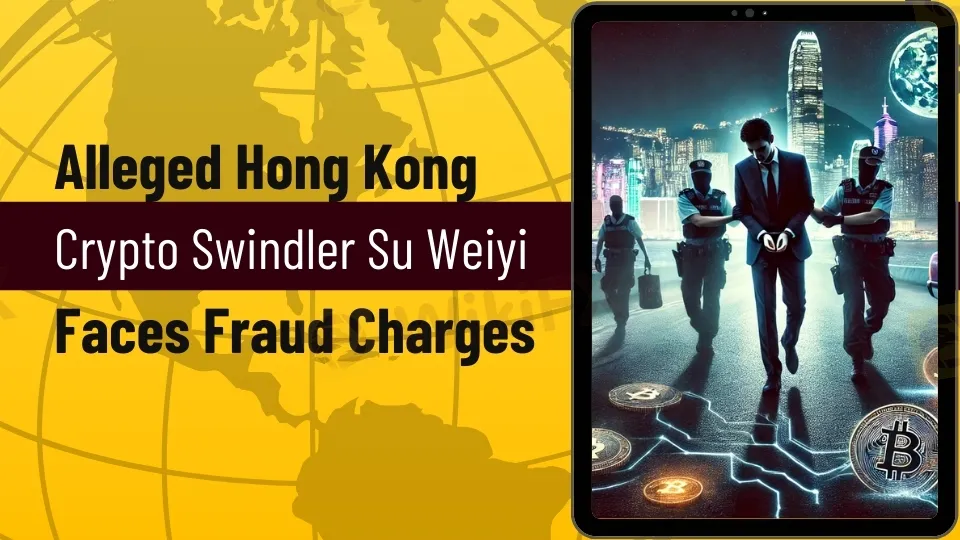简体中文
繁體中文
English
Pусский
日本語
ภาษาไทย
Tiếng Việt
Bahasa Indonesia
Español
हिन्दी
Filippiiniläinen
Français
Deutsch
Português
Türkçe
한국어
العربية
Alleged Hong Kong Crypto Swindler Su Weiyi Faces Fraud Charges
Abstract:Su Weiyi, the alleged mastermind of Atom Asset Exchange, faces charges of theft in Hong Kong after the platform’s collapse. The case uncovers links to Southeast Asian crime syndicates.

Hong Kong authorities have charged Su Weiyi with theft after the collapse of Atom Asset Exchange (AAX) in 2022. The platform, once popular with over two million users, collapsed under fraud and mismanagement accusations. Now, Su Weiyi is the focus of an investigation spanning Hong Kong, Singapore, and the Philippines. The case raises serious concerns about links between cryptocurrency platforms and organized crime in Southeast Asia.
The Fall of Atom Asset Exchange (AAX)
In 2022, AAX suddenly shut down, leaving millions of dollars in user assets unaccounted for. Investors were shocked when their funds vanished, sparking a major scandal. Hong Kong police named Su Weiyi as the “mastermind” behind the platforms collapse. They accuse him of stealing millions in digital assets. He later returned to Hong Kong, where he now faces theft charges.
The case is closely followed by legal experts, regulators, and investors. Su Weiyi has not yet been convicted.
Ties to Money Laundering in Singapore and the Philippines
Su Weiyis involvement goes beyond AAX. Corporate records show he co-owned companies with people linked to a money laundering syndicate in Singapore. This group is under investigation for online scams and human trafficking. These links have raised concerns about how criminal networks are using cryptocurrency platforms across Southeast Asia.
Su Weiyi is also connected to Wang Dingkai, a businessman involved in cryptocurrency scams in the Philippines. In 2023, Philippine authorities raided a firm co-founded by Wang. The firm was involved in both investment scams and human trafficking. Su Weiyis ties to these activities highlight the growing use of digital assets to launder money.

Growing Concern Over Cryptocurrency Scams
As cryptocurrency markets grow in Southeast Asia, scams are increasing. The United Nations Office on Drugs and Crime (UNODC) has warned about the rise of organized crime tied to cryptocurrency exchanges. Digital platforms are becoming tools for money laundering and other illegal activities.
Benedikt Hoffmann, deputy representative for Southeast Asia at the UNODC, noted that business networks, both legal and illegal, are becoming more complex. The case involving Su Weiyi and Wang Dingkai shows how these networks operate across borders, mixing legal business with criminal operations.
Related News:
No Proof of Money Laundering via AAX, but Questions Remain
There‘s no direct evidence that AAX was used for money laundering. However, Su Weiyi’s ties to organized crime raise concerns. Experts wonder if some profits from scams and human trafficking flowed through AAX. Investigators are still looking into these connections. This case reveals how vulnerable cryptocurrency platforms are to illegal financial activities.
Regulators and Legal Experts Step In
As the investigation continues, regulators and financial crime experts are increasing their efforts to monitor cryptocurrency markets. Hong Kong and Singapore, two major financial hubs, are tightening controls to prevent fraud and money laundering in these digital ecosystems.
Legal professionals and law enforcement are working to uncover the full extent of the criminal networks linked to AAX and other cryptocurrency scams. This case could set a new standard for future investigations into digital currency schemes.
Conclusion
The case against Su Weiyi, accused of orchestrating one of Hong Kong‘s largest cryptocurrency frauds, has drawn global attention. His ties to money laundering in Singapore and scams in the Philippines highlight the dangers of Southeast Asia’s growing cryptocurrency industry. Investors, regulators, and legal professionals are watching closely as this case could shape the future of cryptocurrency markets and efforts to fight financial crime.
Get the latest on the Su Weiyi case and more financial news. Visit WikiFX News for full coverage.

Disclaimer:
The views in this article only represent the author's personal views, and do not constitute investment advice on this platform. This platform does not guarantee the accuracy, completeness and timeliness of the information in the article, and will not be liable for any loss caused by the use of or reliance on the information in the article.
Read more

First Unfair Trading Case Reported Under South Korea’s Virtual Asset User Protection Act
The Financial Services Commission (FSC) of South Korea has disclosed the first case of unfair trading following the enactment of the Virtual Asset User Protection Act. This law, which took effect in July 2024, aims to regulate the cryptocurrency market and protect investors from fraud and market manipulation.

Upbit Faces Severe Penalties for AML and KYC Violations
Upbit, South Korea’s leading cryptocurrency exchange, faces severe penalties for over 700,000 AML and KYC violations.

BSP Pushes for a Cashless Philippines by 2025
The BSP accelerates cashless transactions, aims for a coin-lite society, eliminates small fund transfer fees, and drives financial inclusion by 2025.

Maya Bank Disburses PHP 68B in Loans, Sets 2024 Record
Maya Bank disburses PHP 68B in loans in 2024, advancing financial inclusion with digital banking innovation, BSP compliance, and secure financial solutions.
WikiFX Broker
Latest News
How Long Can the Dollar Remain Strong?
Forex Price Trend Prediction! | Come be a New Year Price Winner!
HFM NY Special Offer!
How a Promised RM1.4 Million Return Turned into a Costly Scam
First Unfair Trading Case Reported Under South Korea’s Virtual Asset User Protection Act
Cinkciarz.pl Under Fire: Frozen Accounts, Missing Funds
“Predict and Win” Big Rewards! Join the Contest Now
South Korean President Yoon Suk Yeol's Arrest Shakes Markets
Titanium Capital LLC Ponzi Scheme: Henry Abdo Admits Fraud, Impacting Over 200 Investors
South Korea's Crypto Regulation Updates for 2025
Currency Calculator







